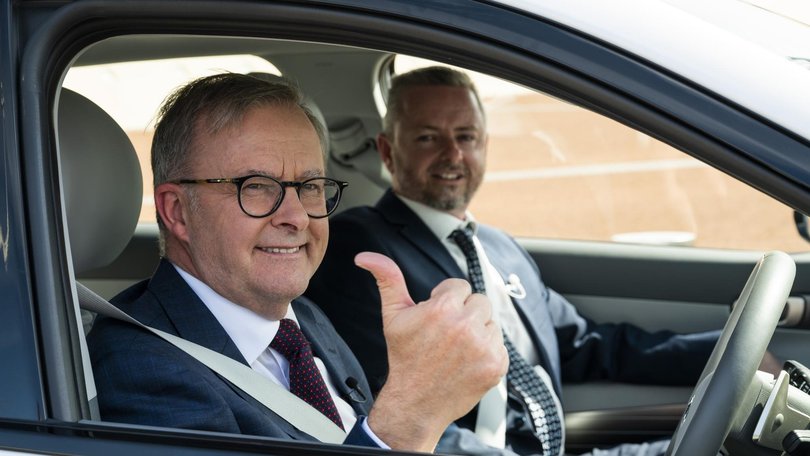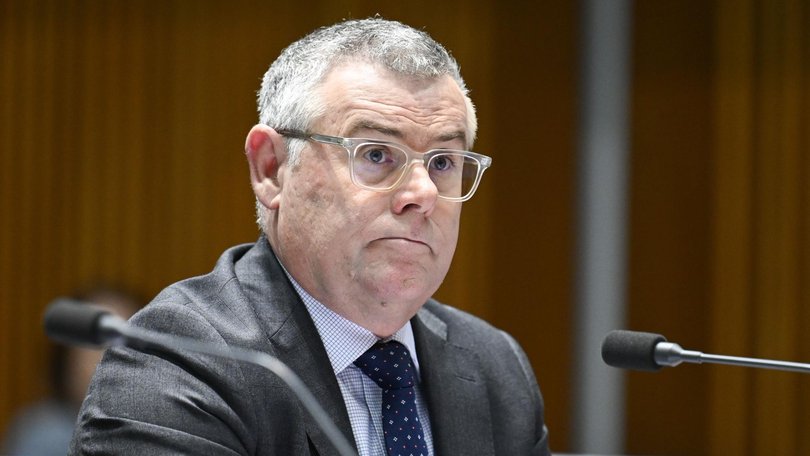Free ride could soon be over for EV owners as the Australian Government eyes national road-user charge
As petrol and diesel cars disappear from the roads, senior Labor ministers admit it’s ‘no secret’ EV drivers may soon face new fees to help pay for Australia’s crumbling infrastructure.

The free ride could soon be over for electric vehicle owners as the Federal Government confirms it’s eyeing a national road-user charge.
As petrol and diesel cars disappear from the roads, senior Labor ministers admit it’s “no secret” EV drivers may soon face new fees to help pay for Australia’s crumbling infrastructure, with speculation it’s on the agenda at next week’s economic reform roundtable.
Social Services Minister Tanya Plibersek said the measure was being considered as declining numbers of petrol and diesel vehicles eroded Australia’s fuel excise revenue — a major source of road funding.
Sign up to The Nightly's newsletters.
Get the first look at the digital newspaper, curated daily stories and breaking headlines delivered to your inbox.
By continuing you agree to our Terms and Privacy Policy.“It’s no secret that as the number of petrol vehicles and diesel vehicles goes down, the take from fuel excise decreases. That means less money for building and maintaining roads. So, the States and Territories have been looking at this for some time,” she said.
The Sydney MP stressed any charge “wouldn’t be happening tomorrow” but said it was important to consider long-term measures to secure road funding.
“I’m sure the Treasurer will be very interested in the discussion,” she said.
Fellow frontbencher Murray Watt downplayed the discussions.
“It’s no secret that we’ve said previously we’ll work with the states and territories on this matter,” Watt said.

Senator Watt said it was too “premature” to say when the charge would be enforced.
“You’d be aware that there was a High Court decision which really raised this issue front and centre and ever since then, we’ve been working with the states and territories,” he added.
Victoria had tried to implement a State-based road-user charge in 2021 but the proposal was struck down in 2023 by the High Court of Australia.
Identifying that it needs to be introduced at a Federal level the Albanese Government is working on a scheme of its own.
Federal Labor support for the charge came as Treasurer Jim Chalmers attended an Infrastructure Partnerships Australia-hosted road-user charging forum alongside industry members and public servants in Sydney on Monday.
IPA chief executive Adrian Dwyer told the ABC momentum was growing to introduce a distance-based charge for EV owners and said it would have little impact on EV adoption.
Nationals MP Barnaby Joyce said he supported EV drivers paying their fair share.
“They definitely should, 100 per cent they should,” Mr Joyce said.
Mr Joyce said current system unfairly benefitted city drivers who were less likely to use combustion-powered vehicles than those in the regions.
“I have a sense there’s a lot of EVs in Tanya’s electorate. We out here are overwhelmingly combustion engines because… it’s different terrain and we feel that we’re paying the excise that other people in the inner city are getting away with,” he said.
Opposition leader Sussan Ley accused the Albanese Government of convening the three-day roundtable next week to “work out how they can levy more taxes on Australians” using the EV charge as an example.
“They’re getting ready for their productivity roundtable. It’s three days of working out how they can levy more taxes on Australians. We’re watching them closely,” she told 4GB radio on Monday.
Roads Australia chief executive Ehssan Veiszadeh was among guests at the Sydney forum and welcomed the charge, saying there needed to be a fair, transparent and future-ready fee system.
“Fuel excise revenue is in terminal decline. Without reform, we risk a future where our roads are underfunded, unsafe, and unable to support the demands of a growing population,” Mr Veiszadeh said.
“We’re not just talking about replacing a tax — we’re talking about rebuilding equity in how we fund the roads Australians rely on every day.”
EV Council chief executive Julie Delvecchio warned against introducing a fee.
“Reforms should only apply once electric vehicles reach 30 per cent of new vehicle sales,” she said.
New Zealand has already implemented an all road-user charge.
